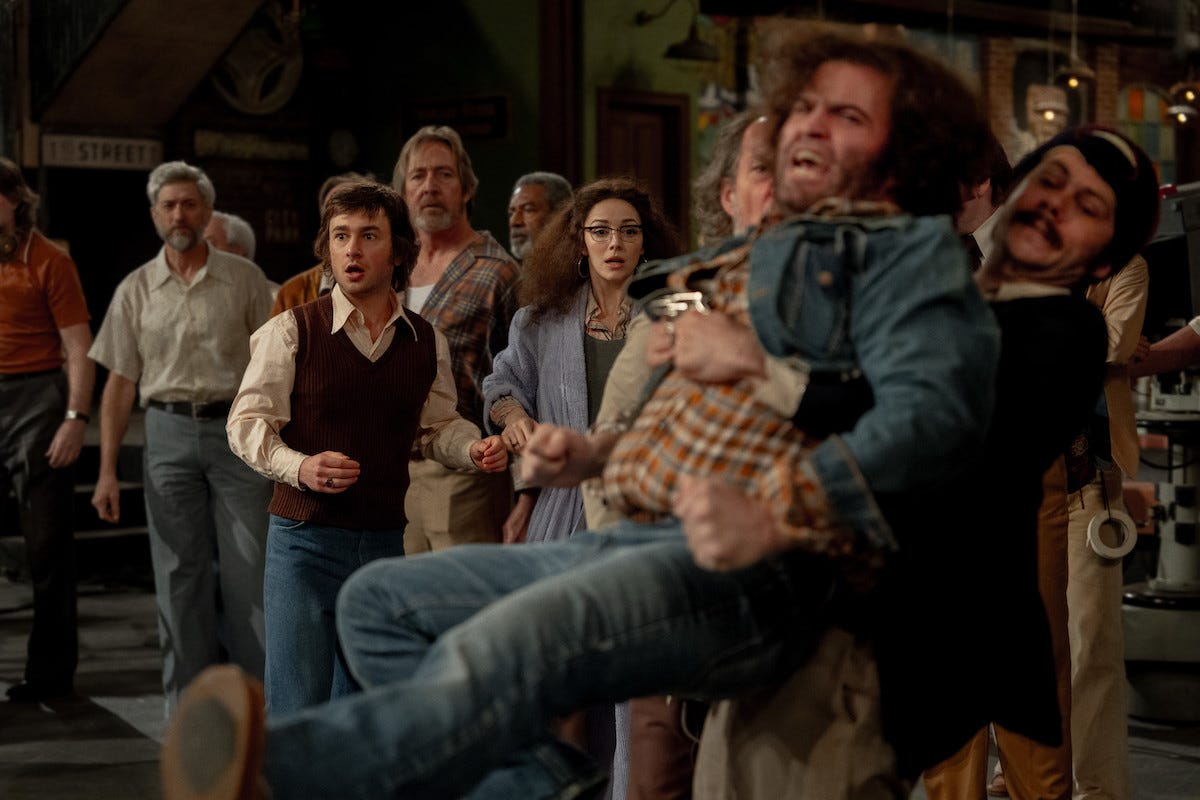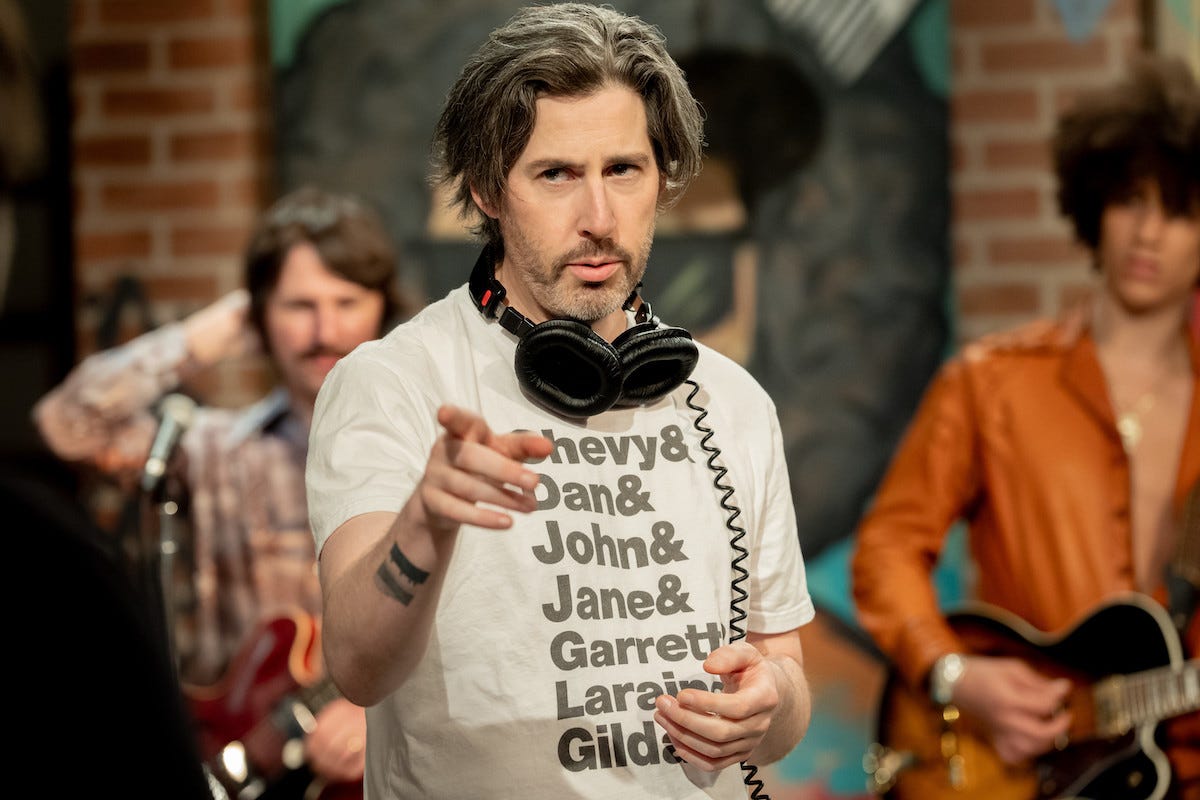Saturday Night is a movie about controlled chaos and the artistry that can come from the collision of new and old, from cramming the vitality and irreverence of youth into the confines of something tried and true. “Can” come, not necessarily “will” come—after all, collisions frequently leave nothing but shattered glass and broken bones.
Told in not-quite real-time, Saturday Night chronicles the 90 minutes before showtime immediately preceding the first episode of Saturday Night Live. Lorne Michaels (Gabriel LaBelle) is desperately trying to corral his gang of Not Ready for Prime Time Players: manic ball of energy John Belushi (Matt Wood); pretty-faced Chevy Chase (Cory Michael Smith); lovably awkward Gilda Radner (Ella Hunt); African-American cast member annoyed by his lack of sketch presence Garrett Morris (Lamorne Morris); sharp-featured and sharp-tongued Jane Curtin (Kim Matula); and friendly, fast-talking Dan Aykroyd (Dylan O’Brien).
But Lorne has problems beyond the cast. The NBC execs are breathing down his neck. The director of weekend late-night programming, Dick Ebersol (Cooper Hoffman), wants to push the show back a week to give them a chance to nail everything down before they try one live. The network’s VP of talent relations, Dave Tebet (Willem Dafoe), wants to push the show’s collective head in a shallow bucket of water, drowning it in order to save money by airing Johnny Carson reruns. Oh, and Jim Henson and Andy Kaufman (both played by Nicholas Braun) are wandering around, trying to figure out what, precisely, they’re doing there.
I could go on and on just listing names of actors (Robert Wuhl! Rachel Sennott! J.K. Simmons! Tracy Letts!) and characters/people from SNL history (Michael O’Donoghue! George Carlin! Don Pardo!); suffice to say, director Jason Reitman and casting director John Papsidera have assembled a fantastic and fantastically talented squad. The faces we recognize are visually and aurally spot-on, while the behind-the-scenes talent is a real murderer’s row.
The member-berries are there, I guess is my point: These guys look and sound like the big stars we remember from the show’s original run (or, you know, replays of the show’s original run, since it debuted about eight years before I was born and I probably didn’t watch any of these guys until a decade after that auspicious occasion). As someone who has read about the dark genius of O’Donoghue—first at National Lampoon and later at SNL—it was amusing to see him brought to life. But does Saturday Night have a reason for being beyond that? Does it need one?
Respectively: Yes it does, though no it doesn’t. What Reitman is grasping for in this movie—and what, I think, he achieves via his constantly moving camera, roaming the halls of 30 Rock as costumers and writers and musicians ricochet around—is the excitement of the new. Everyone is bouncing off the walls and each other; the screen calls to mind one of those diagrams of Brownian motion tracking how chaotic matter in various forms gets when heat is introduced.
It’s the heat that matters as much as the matter, is Reitman’s visual and thematic point. Here, the heat is the stricture of being live and thus having a precise starting and stopping time, as well as the boundaries that come with network TV and the joys of butting up against them. I’ve seen some dismiss this film in toto because the real star of the show is Lorne Michaels—a suit, middle management, a guy who makes the trains run (mostly) on time—but that’s fair neither to the movie nor to Michaels. I’m sorry, Lorne Michaels is a genius and would be so if only for spearheading SNL and Kids in the Hall; the man has almost singlehandedly defined the contours of mainstream North American comedy for the last five decades, and it’s perfectly fine to pay homage to him. Someone has to make the trains run (mostly) on time, after all; if they don’t, no one ever gets to see John Belushi fake a heart attack on Weekend Update.
Saturday Night captures the excitement of the new, the glory of revolution. The comedy revolution of the late 1960s and 1970s—the confluence of National Lampoon and Saturday Night Live and Monty Python’s Flying Circus and the standup of Steve Martin and the films of Albert Brooks—was electric. I’d be remiss in failing to note that there’s at least some irony that the film captures that electricity of the new by highlighting something that happened 50 years ago, that it’s a variation on the celebration of intellectual property management that brings it close in spirit to produpics like Air and Tetris.
We live in an era of cinematic repetition and reiteration, in which the endless propagation of intellectual property is a goal unto itself. I’m not making some sort of new or radical case here; all you have to do is look at the box office charts. All ten of the highest-grossing films of the year are sequels. The rise of AI is only likely to make this worse, the future literally generated by feeding the corporate-owned past into a machine and seeing what glop that machine spits out. Stars will sell their likenesses for a relative pittance and then let the machine put them in whatever they want, content to sit on a beach somewhere and drink Bahama Mamas while they wait for the big green room in the sky.
Consider the strange case of Jack Nicklaus, highlighted by Eriq Gardner in a Puck newsletter this week. Long story short: Nicklaus wanted to retire from doing public-facing stuff, though he still wanted to design golf courses and hang around the PGA. So, 15 years ago, he signed a $145 million deal for his name and image with a friendly businessman. Nicklaus doesn’t like how his likeness has been used—specifically, he objected to the suggestion that he would have supported the Saudi-backed LIV in their war against the PGA—and is trying to get the rights back by saying the company violated his “moral rights.” The businessman who owns the rights is pushing back, leading to this “particularly surreal” twist:
[A] recent effort by [real estate and banking billionaire Howard] Milstein to suspend the Florida case adds yet another layer of intrigue. Milstein’s legal team argues that Nicklaus’s defamation claim hinges on first proving the company has no right to his name, image, and likeness. In other words, Milstein is coming extremely close to asserting that someone who sells rights to his or her name forfeits the right to object to how that name fares in the public eye. Or, put another way, if anyone ever defames Jack Nicklaus, it would be Milstein, not Nicklaus, who could plead injury, because Milstein now “owns” the brand.
On the one hand, this feels completely insane. Conversely, it is the obvious legal and ethical conclusion to selling yourself to the highest bidder, a sort of perpetual virtual slavery.
Needless to say, I’m curious to see how this shakes out. Either way, it’s yet another reminder of the stagnant decadence in which we exist: We’re arguing over the continued virtual existence of a guy who won his first major 62 years ago. Now, sports are different than movies, at least in the sense that competition leads to new figures emerging on a regular basis. I’m not sure an endorsement from Nicklaus will hold more weight for golf fans than an endorsement from, say, Scottie Scheffler. But the dream of Hollywood has always been to create an eternal movie star; there’s something so messy and annoying about that whole discovery process.
That stultifying, generic sameness is what the folks portrayed in Saturday Night were pushing against; there’s a great scene in which Michaels travels to a different floor of 30 Rock to poach a lighting guy from a variety show and the corny sameness of it all provides him a horrifying glimpse of his own future if he can’t pull off his sketch show. But it’s telling that our own comedic and cinematic scenes are so stultified that the only way we can recapture that manic joy is by looking into the past.





The listing of acts which provided the confluence of the comedy revolution of the late '60s and '70s is not complete unless the first mainstream one is mentioned. Rowan and Martin's Laugh-In was a TV show like no other, and was the start of the revolution, pressing previously set boundaries yet somehow remaining mainstream.
Man, at my screening I had a dude just going to town on his home-brought snacks and the sound was f*cked so the soundtrack played louder than the dialogue. Yet, I was still utterly captivated by it all.
Speaking to things being better in the past, I told an usher and they just sort of shrugged. Back when I worked in a theater as an usher I would have radio’ed the projectionist and they would have fixed it. Sometimes the past is actually better